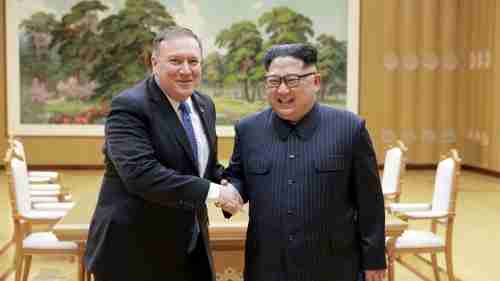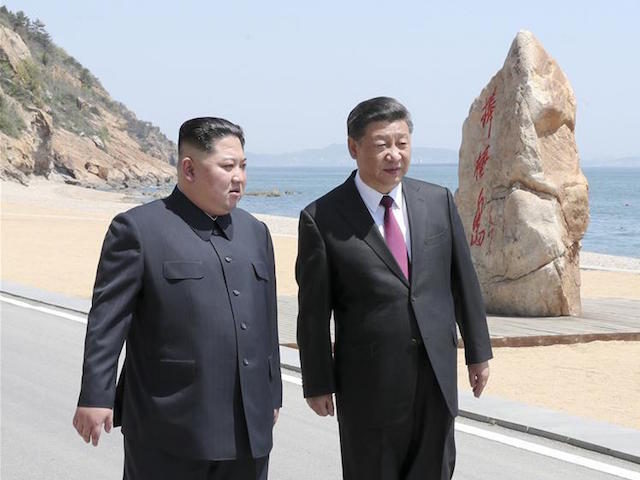This morning’s key headlines from GenerationalDynamics.com
- China, North, and South Korea confounded by cancellation of Kim Jong-un meeting
- Trump pursues risky strategy, trying to avoid a greater risk
China, North, and South Korea confounded by cancellation of Kim Jong-un meeting

Mike Pompeo and Kim Jong-un shake hands prior to their May 9 meeting in Pyongyang (Reuters)
President Donald Trump announced on Friday morning that he was canceling the planned meeting of Secretary of State Mike Pompeo with North Korea’s president Kim Jong-un in three tweets:
I have asked Secretary of State Mike Pompeo not to go to North Korea, at this time, because I feel we are not making sufficient progress with respect to the denuclearization of the Korean Peninsula
…
Additionally, because of our much tougher Trading stance with China, I do not believe they are helping with the process of denuclearization as they once were (despite the UN Sanctions which are in place)
…
Secretary Pompeo looks forward to going to North Korea in the near future, most likely after our Trading relationship with China is resolved. In the meantime I would like to send my warmest regards and respect to Chairman Kim. I look forward to seeing him soon!
This is the first time that I am aware of that Trump has tied together these two major issues: denuclearization of North Korea and the trading dispute with China. Significantly, he seems to imply that negotiations with North Korea will be put on hold until some resolution is reached on the trading issue.
Finally, the tweets imply that China is at fault and that Kim is just doing what China is telling him to do.
By ending negotiations with North Korea, these tweets undercut repeated demands by the North Koreans for the U.S., North Korea, South Korea, and China to sign a peace treaty officially ending the 1950s war in Korea, which ended in 1953 with a ceasefire armistice agreement.
The Chinese would very much like to get an agreement officially ending the Korean War since such an agreement would then be followed by demands to remove American troops from South Korea, and particularly to remove the Terminal High Altitude Area Defense (THAAD) currently deployed in South Korea. Nominally, THAAD is an anti-missile system deployed to protect South Korea from North Korean missiles, but the Chinese particularly object to the THAAD’s powerful radar capabilities that see far into Chinese territory and could provide an early warning of a Chinese missile attack.
China’s foreign ministry issued a statement saying the following:
China’s position on the Korean Peninsula nuclear issue is consistent and clear. We are committed to achieving denuclearization on the Korean Peninsula, maintaining peace and stability on the Korean Peninsula, and resolving this issue through dialogue and consultation. For all these years, China has been making unremitting efforts for this issue’s proper settlement. We have been playing an important and constructive role and comprehensively and strictly implementing the DPRK-related resolutions of the Security Council. All these efforts are witnessed by the international community.
South Korea’s foreign ministry issued a statement saying the following:
It’s most important to maintain a long-term view while maintaining a momentum for dialogue and concentrate diplomatic efforts to faithfully implement the agreements from the summits between South Korea and North Korea and between North Korea and the United States, instead of attaching meaning to each change in the situation.
While we consider the delay of the visit to North Korea as unfortunate, we believe it’s most important for the North Korea-U.S. dialogue including Secretary Pompeo’s visits to North Korea to contribute to substantial progress in complete denuclearization and the establishment of a permanent peace regime in the Korean Peninsula.
Regular readers know that Generational Dynamics predicts that China and the US are headed for a major world war with 100 percent certainty. Furthermore, North Korea will never agree to denuclearization, after decades of having starved, tortured, and brutalized the North Korean people, promising that it was all worth it because one day North Korea would be a nuclear power and would be a great nation, a peer to the United States. The Hill and Foreign Ministry of China and AP and South China Morning Post (28-Jul) and VOA
Trump pursues risky strategy, trying to avoid a greater risk
The media is filled with the usual statements about Trump’s unhinged policies borne out of personal frustration, or about how State Department personnel were blindsided by the announcement. So it is pretty clear that the mainstream media don’t have even the slightest clue what’s actually going on.
On the other hand, Dear Reader, if you are one of the ones who believe that Trump is the grandmaster at “The Art of the Deal” and you want to learn something, the best way to proceed is from the assumption that there’s an actual rational strategy behind the tweets.
If you want to try to make sense of what Trump is doing, then you have to start with the Generational Dynamics predictions that we are headed for a world war with China, and that under no circumstances will North Korea agree to denuclearize, and that their only objective is to get the sanctions lifted while continuning development of nuclear missiles targeting the United States.
What has been obvious from the day that Trump took office is that everything he has done in foreign policy is based on being aware of these predictions and on his determination to keep them from actually coming to pass. And as I have said many times, I am not going to criticize Trump for taking actions to try to prevent a world war, even if preventing a world war is impossible.
Trump’s aggressive tariffs and trade policy toward China makes sense if you understand it as a strategy of trying to throw China’s entire political strategy off-balance, in order to derail continued preparations for war. China keeps insisting that it wants nothing but stability, in North Korea and in trade, and that is true because they do not want to be distracted in war preparations. Trump’s imposed tariffs are causing significant economic disruptions to China’s economy – which is already in a great deal of trouble – while North Korea’s threats to the United States are keeping U.S. military forces deployed in the region, and THAAD anti-missile and radar systems deployed in South Korea.
Trump’s strategy makes sense, but that does not mean it is going to work. It is highly risky in the sense that it could trigger an earlier war. We are already in a tit-for-tat escalation pattern with China, and so is Taiwan. This is exactly the pattern that leads to a major war in a generational Crisis era. But the “soft diplomacy” strategy employed by the Obama administration was certain to lead to war as well. Every strategy today leads to unavoidable war.
The negotiations have been completely stalled for weeks. North Korea has shown no sign of denuclearization. According to some reports, Mike Pompeo was demanding that the North Koreans should produce a list of all its secret nuclear and missile development sites so that inspections can begin. According to another report, Pompeo is asking that North Korea hand over 60-70 percent of its nuclear warheads so that another country can remove them from North Korea. Intelligence officials say that North Korea is unwilling to agree to either of these steps, even under considerable concessions from the American side, and furthermore that North Korea has been continuing nuclear and missile development all year.
Furthermore, the U.S. has found that shipping and trading firms based in China, Russia, and Singapore have been using clandestine methods to cheat on the United Nations sanctions.
There was really no point to the Pompeo-Kim meeting anyway, so canceling the meeting makes sense just from that point of view alone. But it also shows that – take your pick – Trump is completely unhinged or a hardheaded negotiator. Whichever one the politicians in Pyongyang, Beijing, and Seoul believe, they still have to deal with Trump, and maybe North Korea will be willing to get rid of at least 10 percent of its nuclear arsenal. It is possible that’s what Trump is hoping for. South China Morning Post and Vox and Politico and Vox (8-Aug)
Related Articles:
- US imposes new North Korea sanctions on Chinese and Russian shipping companies (17-Aug-2018)
- John Bolton and Marco Rubio describe North Korea strategy, as sanctions are violated (06-Aug-2018)
- North Korea appears to dismantle its Sohae satellite launch site (26-Jul-2018)
- After the Kim-Trump summit, US and N. Korea plan denuclearization details (14-Jun-2018)
- NY Times publishes a generational analysis of South Korea (30-Jan-2018)
KEYS: Generational Dynamics, China, North Korea, South Korea, Mike Pompeo, Kim Jong-un, Terminal High Altitude Area Defense, THAAD
Permanent web link to this article
Receive daily World View columns by e-mail

COMMENTS
Please let us know if you're having issues with commenting.